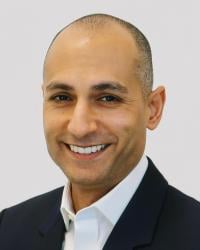Nadir Mahmood, Ph.D., is a relatively soft-spoken individual in an industry that can be dominated by people with more intensity and grandiosity. So, when he tells you about his new exciting role as CEO of Rezo Therapeutics, you'd be mistaken for thinking he was rattling off some mundane preclinical data.
“I love the big, risky, super transformational opportunity with a big vision,” he said in an exclusive interview with Fierce Biotech. “That's what gets me motivated.”
The former chief financial and business officer of Nkarta Therapeutics was announced as the new CEO of Rezo Therapeutics on Wednesday. Mahmood, who started in July, says he’s ecstatic, although that was expressed in his signature deadpan tone.

A spinout of the University of California, San Francisco, Rezo combines numerous protein tracking technologies to create biological “maps” that can uncover new ways to treat disease. One of the company’s co-founders and chairman of the board is ex-Vir Biotechnology and Biogen CEO George Scangos, Ph.D.
Co-founder and president Nevan Krogan, Ph.D., described the platform in a way that’s similar to Google Maps when there’s an accident in the road. Treating dysfunction in your body, be it inflammation or a growing tumor, requires knowing the right pathways to attack and fix the dysfunction. But if you don’t know the best routes to get there, you may wind up in traffic for hours on end—or, for the sake of this metaphor, seriously sick. Rezo combines proteomics, gene sequencing, structural biology and chemical biology, among other tools, to have a better grasp of how groups of proteins connect with each other, opening more and more potential therapeutic routes.
The technology, dubbed the Sequence to Systems to Drugs platform, allows Rezo to be disease- and modality-agnostic. The first focus, however, is small molecules to treat solid tumors.
That seemingly puts Rezo smack dab in a debate about the impact of the Inflation Reduction Act’s pricing policies, which legislated that small molecules have nine years before being subject to potential negotiation while biologics have 13 years. Mahmood is not concerned.
“We've got optionality, but right now, based on kind of what we're seeing and where we're starting, we're in a small-molecule space,” he said.
As of now, the company is still well financed thanks to a $78 million funding round announced in November 2022 led by a16z and SR One. Mahmood says the company has a runway for “a few years” that allows the company to hire more staff and bring a lead candidate right up to the clinic.
“So we’re thinking about when that next raise could be,” he said, though it’s not necessarily imminent. He plans to use part of the upcoming J.P. Morgan Healthcare Conference to reconnect with investors.
In the near term, Mahmood will continue to build out the team, particularly in areas of drug discovery and early development as a pipeline takes shape. Krogan is staying on as president and board member while continuing to run the Quantitative Biosciences Institute, where Rezo was born. When asked how he plans to do both, Mahmood chimed in that he doesn’t need to sleep. But Krogan said the reality is that all the work is, just like the platform, interconnected.
“The work that we're doing [at the QBI] benefits Rezo and a lot of the stuff happening at Rezo benefits [the QBI],” he said. “So it's taking things over here, taking it over to Rezo, and they can use it in ways to develop drugs.”